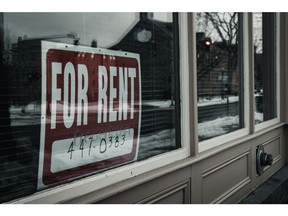New Brunswick vacancy rate hits lowest on record, rent costs soar
Low vacancy rate of 1.5 per cent has helped push prices up

Article content
The vacancy rate for apartments in New Brunswick has reached its lowest on record, with only 1.5 per cent of units available for rent in October 2023, according to the latest data from Canada Mortgage and Housing Corporation.
One year before, the rate was 1.9 per cent vacancy.
It’s the same nationwide trend that’s pushed up people’s rent throughout Canada.
The provincial rate, equal to the national vacancy rate of 1.5 per cent, is the lowest since CMHC began tracking the data in October 1990.
Vacancy in New Brunswick reached a high of 8.8 per cent in October 2013. But it’s been on a downward trend since then.
The shortage of units has led to much higher prices, worsening an affordability crisis.
The average rent for an apartment in New Brunswick late last year was $1,112 a month, an increase of 9.5 per cent over the year before, when the average rent was $1,006 a month.
In October 2020, the average was only $849 a month.
Sadly, for many of these people, they’re forced to make decisions between buying groceries, paying rent or paying the heating bill.
Nichola Taylor
Affordable housing advocates said the latest data were further proof the Higgs Progressive Conservative government’s policies were not protecting tenants, especially the most vulnerable.
“The government stance on housing just isn’t working,” said Nichola Taylor, the co-chair of Acorn NB. “These statistics clearly show that. They need to put proper rent control in place to protect tenants because even with the legislation they brought in last year, landlords are basically raising rent as high as they like in many cases.”
“A rent cap is needed urgently.”
Taylor, her husband and daughter were forced out of their Fredericton apartment building two years ago when the landlord decided to renovate the units and then raise the rents.
In the dead of winter, she and several other tenants, many of them elderly, protested what they called a “reno-viction” on Main Street during rush hour. She eventually found an apartment her family could afford just outside Fredericton, but she still worries about the other tenants who were on fixed incomes.
One of them, a senior, found accommodation in her new building.
“The landlord was very nice and managed to help him out a lot. But if he gets a rent increase now or if he has to move out for whatever reason, he’s going to really struggle to find an affordable place to live within his budget. And we’re seeing that right across the board – seniors, people with disabilities, or people with lower wages, with most of their income going toward rent. Sadly, for many of these people, they’re forced to make decisions between buying groceries, paying rent or paying the heating bill.”
Housing minister Jill Green has argued that rent caps and other harsher measures for landlords risk worsening the housing crisis. Developers and the apartment owners’ association have told her investors won’t build new apartments if there are too many regulations ensnaring their business.
But she’s also promised to introduce new measures if the statistics show the problem worsening.
On Thursday, the Tory government issued a press release inviting people to email suggestions for the latest provincial budget by the end of the month. Among the four questions it asked: What steps can be taken to increase the housing supply?
Although more units have been built in New Brunswick, it’s not keeping up with demand. Near the end of 2022, New Brunswick had 38,252 private apartments. A year later, it had 39,423, according to the CMHC data.
“With the dramatic increase in rents, we’re advocating for a robust rent regulation regime,” said Tobin LeBlanc Haley, a sociology professor at the University of New Brunswick and a spokesperson for the New Brunswick Coalition for Tenants Rights. “Tenants need to plan, year over year, what they are going to pay. And that figure of nearly 10 per cent is way over and above the consumer price index.”
LeBlanc Haley discounted the idea that developers would be scared off by stricter measures to protect tenants.
She pointed out that New Brunswick had lower residential building starts in recent years compared to provinces with rent control.












Postmedia is committed to maintaining a lively but civil forum for discussion. Please keep comments relevant and respectful. Comments may take up to an hour to appear on the site. You will receive an email if there is a reply to your comment, an update to a thread you follow or if a user you follow comments. Visit our Community Guidelines for more information.